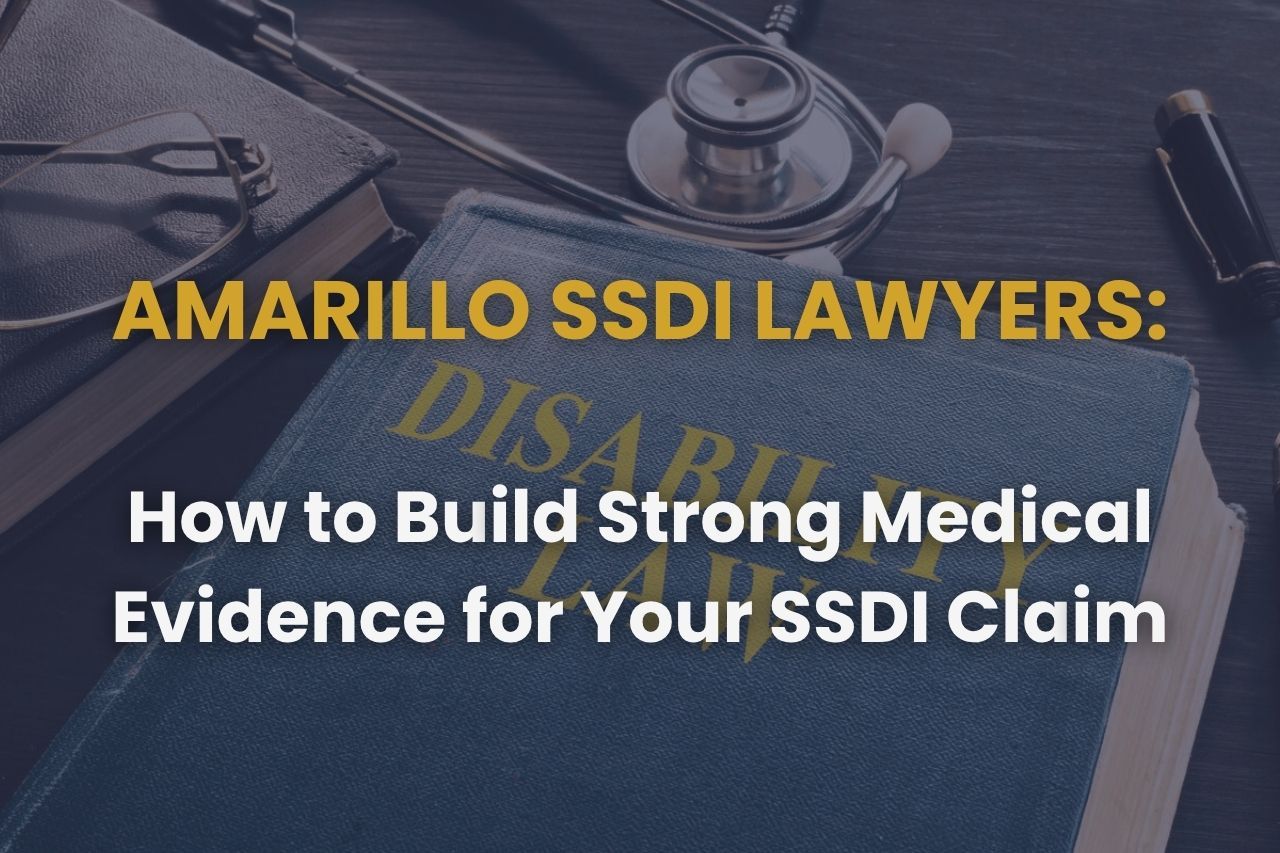Amarillo SSDI Lawyers – How to Build Strong Medical Evidence for Your SSDI Claim
6/6/2025 | 8 min read

If you live in Amarillo, Texas, and can no longer work due to a serious medical condition, Social Security Disability Insurance (SSDI) could provide critical financial support. But even if your condition is real, your SSDI application will likely be denied if you don’t present enough strong medical evidence.
The Social Security Administration (SSA) relies heavily on medical documentation to determine eligibility. In this guide, Amarillo SSDI lawyers explain what you need—and how to organize it—to increase your chances of success.
What Counts as Medical Evidence for SSDI?
The SSA requires “objective medical evidence” from acceptable medical sources to confirm your diagnosis, severity, and how your condition limits your ability to work.
Acceptable medical sources include:
-
Medical doctors (MD/DO)
-
Licensed psychologists or psychiatrists
-
Certain nurse practitioners and physician assistants
-
Speech-language pathologists, optometrists, and podiatrists (for specific conditions)
🔗 SSA’s definition of acceptable sources
✅ Tip: Evidence from chiropractors or alternative healers doesn’t carry the same legal weight with SSA.
Types of Medical Records the SSA Looks For
A complete SSDI file should contain more than just a diagnosis. The SSA wants to see a clear picture of your functional limitations over time.
Include the following:
-
Medical history and treatment records
-
Imaging (X-rays, MRIs, CT scans)
-
Blood work or lab results
-
Hospital and ER records
-
Mental health notes and therapy logs
-
Surgery and rehabilitation summaries
-
Physician statements about your limitations
Tips for Strengthening Your Medical File
To avoid a denial based on insufficient evidence, follow these actionable steps:
-
✅ Be Consistent with Treatment Gaps in care make the SSA question how serious your condition is. Attend regular appointments and follow through with prescribed treatments.
-
✅ Keep a Symptom Journal Track pain levels, medication effects, and tasks you can no longer perform. This personal log can support medical opinions.
-
✅ Get a Functional Capacity Evaluation (FCE) An FCE tests your ability to lift, walk, sit, and complete tasks—crucial for proving work limitations.
What Happens If You Don’t Have Enough Medical Evidence?
- Without detailed records, your SSDI claim may be denied even if your condition is disabling. The SSA may issue a consultative exam (CE) with one of their doctors, but that alone often isn’t enough to approve your claim.
🔗 Learn what to do after an SSDI denial
✅ Best Practice: Collect and submit all evidence before the SSA requests a CE.
The Role of Doctors in SSDI Success
Your doctor can make or break your SSDI claim. Beyond treating you, they can submit a residual functional capacity (RFC) form, which describes what you can and cannot do.
Ask your doctor to include:
-
Objective test results
-
A clear statement on work limitations (e.g., unable to sit for more than 30 minutes)
-
Details on how your condition affects daily activities
🔗 SSA RFC forms: https://www.ssa.gov/forms/ssa-4734-f4.pdf
✅ Tip: SSA values records that clearly link medical facts to work-related limitations.
Why Louis Law Group Supports Amarillo Claimants
At Louis Law Group, we’ve helped countless SSDI applicants across Amarillo build strong cases with the right medical support. We guide clients from day one—whether applying for the first time or appealing a denial.
Why clients in Amarillo choose us:
-
Free consultations to assess your claim
-
Clear, compassionate communication
-
Proven strategies that meet SSA’s documentation standards
🔗 Start with our SSDI application support guide
FAQs
Q: What if I don’t have insurance and can’t see a doctor regularly? A: Look for community clinics or public hospitals in Amarillo. The SSA accepts records from qualified providers, even in low-income settings.
Q: Will SSA contact my doctors for records? A: They may, but it’s better to submit the most relevant records yourself. This ensures nothing important is missed.
Q: Can I include records from mental health therapy? A: Yes—especially if your claim involves depression, anxiety, PTSD, or similar conditions.
Q: Do I need a specialist to confirm my diagnosis? A: Specialist evaluations (like neurologists or orthopedists) carry more weight than general practitioners in complex cases.
Q: How current must my medical evidence be? A: The more recent, the better. SSA prefers records from the last 6–12 months.
Conclusion
If you’re filing for SSDI in Amarillo, remember this: your claim is only as strong as the medical evidence you submit. Diagnoses alone are not enough—what the SSA needs is a detailed, consistent, and documented story of how your condition limits your ability to work.
Louis Law Group is here to help Amarillo residents build SSDI applications that stand up to scrutiny. From finding the right documents to communicating with your doctors, we guide you through every step.
Do you have the medical evidence you need to prove your SSDI claim in Amarillo?
Contact Louis Law Group today for a free consultation. Call 833-657-4812 or submit a free case evaluation form to get started. Don’t wait—let us help you take the first step toward justice and financial recovery.
How it Works
No Win, No Fee
We like to simplify our intake process. From submitting your claim to finalizing your case, our streamlined approach ensures a hassle-free experience. Our legal team is dedicated to making this process as efficient and straightforward as possible.
You can expect transparent communication, prompt updates, and a commitment to achieving the best possible outcome for your case.
Free Case EvaluationLet's get in touch
We like to simplify our intake process. From submitting your claim to finalizing your case, our streamlined approach ensures a hassle-free experience. Our legal team is dedicated to making this process as efficient and straightforward as possible.
12 S.E. 7th Street, Suite 805, Fort Lauderdale, FL 33301
